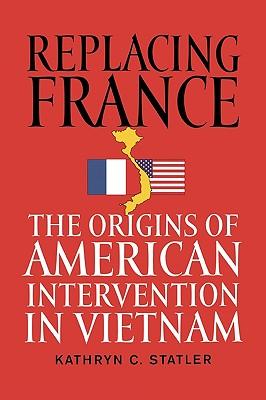Using recently released archival materials from the United States and Europe, Replacing France: The Origins of American Intervention in Vietnam explains how and why the United States came to assume control as the dominant western power in Vietnam during the 1950s. Acting on their conviction that American methods had a better chance of building a stable, noncommunist South Vietnamese nation, Eisenhower administration officials systematically ejected French military, economic, political, bureaucratic, and cultural institutions from Vietnam. Kathryn C. Statler examines diplomatic maneuvers in Paris, Washington, London, and Saigon to detail how Western alliance members sought to transform South Vietnam into a modern, westernized, and democratic ally but ultimately failed to counter the Communist threat. Abetted by South Vietnamese prime minister Ngo Dinh Diem, Americans in Washington, D.C., and Saigon undermined their French counterparts at every turn, resulting in the disappearance of a French presence by the time Kennedy assumed office. Although the United States ultimately replaced France in South Vietnam, efforts to build South Vietnam into a nation failed. Instead, it became a dependent client state that was unable to withstand increasing Communist aggression from the North. Replacing France is a fundamental reassessment of the origins of U.S. involvement in Vietnam that explains how Franco-American conflict led the United States to pursue a unilateral and ultimately imperialist policy in Vietnam.

Replacing France: The Origins of American Intervention in Vietnam
Using recently released archival materials from the United States and Europe, Replacing France: The Origins of American Intervention in Vietnam explains how and why the United States came to assume control as the dominant western power in Vietnam during the 1950s. Acting on their conviction that American methods had a better chance of building a stable, noncommunist South Vietnamese nation, Eisenhower administration officials systematically ejected French military, economic, political, bureaucratic, and cultural institutions from Vietnam. Kathryn C. Statler examines diplomatic maneuvers in Paris, Washington, London, and Saigon to detail how Western alliance members sought to transform South Vietnam into a modern, westernized, and democratic ally but ultimately failed to counter the Communist threat. Abetted by South Vietnamese prime minister Ngo Dinh Diem, Americans in Washington, D.C., and Saigon undermined their French counterparts at every turn, resulting in the disappearance of a French presence by the time Kennedy assumed office. Although the United States ultimately replaced France in South Vietnam, efforts to build South Vietnam into a nation failed. Instead, it became a dependent client state that was unable to withstand increasing Communist aggression from the North. Replacing France is a fundamental reassessment of the origins of U.S. involvement in Vietnam that explains how Franco-American conflict led the United States to pursue a unilateral and ultimately imperialist policy in Vietnam.